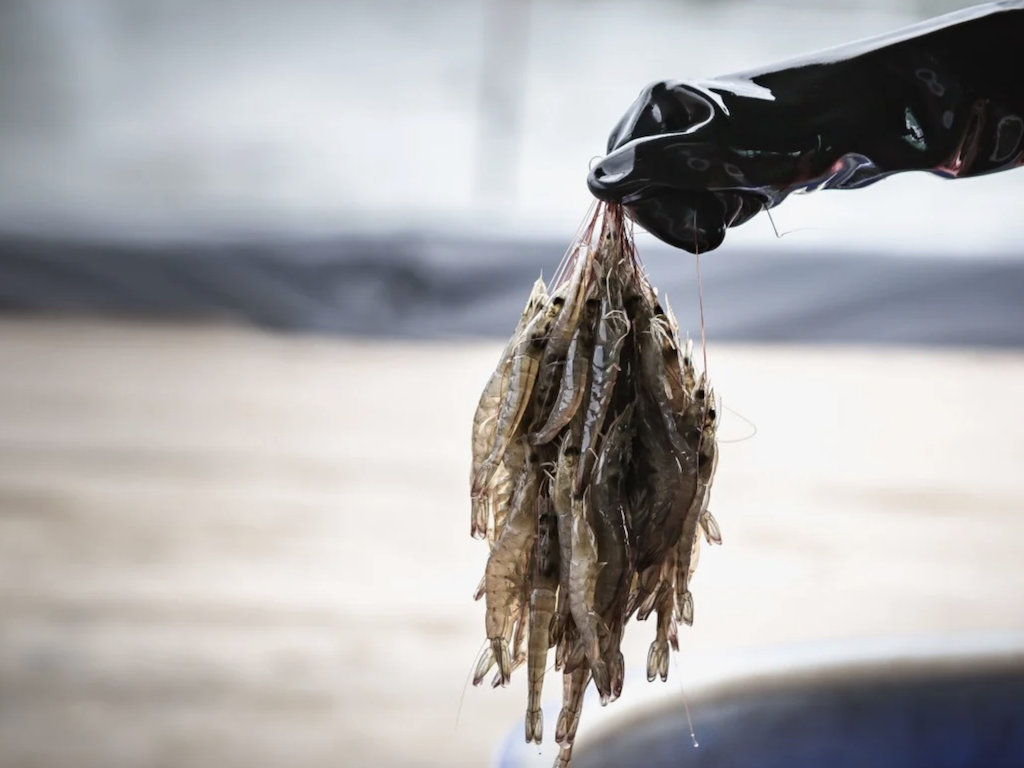3 Mins Read
Shrimp farmers in the southern Chinese province of Guangdong have reported outbreaks of Decapod iridescent virus 1 (Div1), a virus that affects shrimp populations. The disease is not known to be harmful to humans, but can decimate shrimp in just a few days. Fears are now mounting about the potential of the virus to threaten the country’s shrimp industry, much like the African swine flu (ASF) crisis did to China’s pork supplies last year. The news comes amid heightened attention on the vulnerabilities and dangers of the current broken food system due to the coronavirus pandemic.
First detected back in 2014, Div1 has made a return earlier this year in February, infecting around a quarter of shrimp farms in Guangdong province, a key seafood producer region in China. The disease is not harmful to humans, but local farmers are now fearful that the infectiousness and lethality of the virus to shrimp will lead to mass deaths that parallel that of the African swine fever (ASF) crisis, which wiped out almost a quarter of global pork supplies, with China bearing the brunt of the shortage.
According to shrimp farmers in Guangdong, early signs of infection include when shrimp turn reddish in colour. Within a few days, shells of shrimp soften and they sink to the bottom of ponds. Local farmers also said that the virus affects all shrimp species, including white shrimp and freshwater prawns, reported the SCMP.
The Chinese Academy of Fishery Sciences said that the virus appeared in Pacific white shrimp, the predominant species farmed in the Chinese aquaculture industry, and resurfaced in 2018 to affect farms across 11 provinces. In 2019, over two-thirds of ponds in the industry’s Pearl River Delta operations were affected and had to be drained immediately.
While it eased in the latter months of last year, Div1 has made a comeback again a few months ago in February. Experts say that the source of the virus and its transmission routes are still unclear, and that there is still no effective way to prevent its spread.
The news comes as the lingering Covid-19 pandemic has renewed global attention on the vulnerability of the global food system to immediate supply shocks due to widespread travel restriction and export tariffs, but also the public health and environmental dangers that come with livestock and seafood farming.
Over the past years, as living standards and disposable income has steadily increased in China and wider Asia, the demand for animal and seafood protein has increased dramatically. The surging demand has accelerated the loss of ocean biodiversity and contributed to huge amounts of plastic pollution via discarded “ghost” nets. Scientists predict that at our current rate, there will be no seafood left in the ocean and plastic will outweigh fish by 2050.
The spread of Div1 is only the latest in a long list of health and safety concerns related to seafood consumption. A recent study found that fish today contains roughly 283 times more parasites than 40 years ago, which has been linked to roughly 20,000 annual cases of illness after seafood consumption.
Combined with the inability to import foreign premium seafood and meats due to Covid-19, the threat that the resurgence of Div1 poses to domestic crustacean output may decimate the country’s seafood supply.
But there may be a silver lining. Consumers, faced with fewer choices, will be more likely to opt for locally or regionally produced plant produce – which comes at a fraction of the environmental cost and is less exposed to supply chain disruption. Chinese authorities may also see an opportunity to transform the unsustainable food supply by investing in and supporting the growth of alternative protein technologies, such as plant-based and cultivated solutions, to bolster the country’s food resilience.
Lead image courtesy of Shutterstock.




